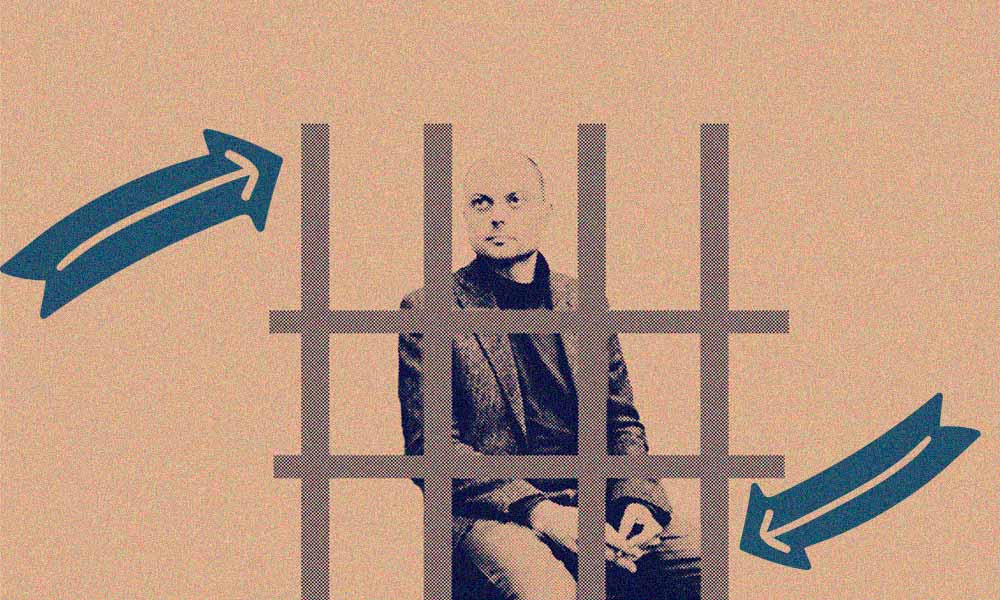With the death of Alexei Navalny, Vladimir Kara-Murza—the crusading and imprisoned Russian journalist—is now the public face of dissent and most prominent democratic opponent of Vladimir Putin’s dictatorship. This is not a distinction that he has aspired to, nor does it fit the role he has played in the Russian democracy movement over the past two decades. He has been a brilliant writer and filmmaker and a courageous democracy activist, but not a national opposition leader like Navalny or Kara-Murza’s late mentor Boris Nemtsov.
He is also not in a position to build a national following right now, since he’s been sent by a Russian court to Omsk, Siberia, where he’s confined in a solitary cell in a “special regime” prison colony, the harshest grade in the Russian penitentiary system. The campaign to secure his freedom is an urgent international priority and has been taken up by a wide range of pro-democracy organizations. He suffers from polyneuropathy, a disease affecting peripheral nerves that is the result of two near-fatal attempts by the regime to poison him, once in 2015 and again in 2017. His 25-year sentence is the longest given to any political prisoner since the last days of Stalin. “In his condition,” Israeli politician and former refusenik Natan Sharansky has said, “even one year is a death sentence.”
Yet somehow, almost miraculously, Kara-Murza, age 42, has been able to maintain his voice and his vision. Just before Navalny’s death, he published a remarkable article in The Washington Post (where he remains a Global Opinions contributor) entitled “Even from a Russian prison, I can see Putin’s weakness.” Drawing on online sources that surprisingly he can still access, as well as the dozens of letters he receives every week from ordinary citizens, he reported on the back story of how the Russian government had barred opposition candidate Boris Nadezhdin from running against Putin in the March presidential election. The motive, he wrote, quoting the sources, was the regime’s dismay at the surprising upsurge of support for Nadezhdin after the candidate called the war in Ukraine “a fatal mistake” and demanded its immediate cessation.
Kara-Murza called the hundreds of thousands of Russians who lined up in January to sign petitions for Nadezhdin’s candidacy “the largest antiwar demonstration in Russia since Putin’s attack on Ukraine” and a sign that the public mood was becoming more hopeful. Nadezhdin agreed, telling journalists that though he had been barred from running, “Russian citizens now feel that change is actually possible in our country.” This doesn’t mean change will happen quickly, Kara-Murza cautioned, “but a society that feels more empowered and more confident about itself is suddenly a force to be reckoned with. And that is bad news for any dictator.”
Miraculously, Kara-Murza has maintained his voice and his vision.
This was vintage Kara-Murza—confident that the Russian people want democracy and that the Putin regime is vulnerable, and determined to speak fearlessly for freedom despite the threats to his own safety, even to his life.
Another theme is central to Kara-Murza’s thinking about building a democracy in Russia under the rule of law: that the transition in the 1990s failed in large part because of the unwillingness of the new democratic leadership “to fully break with the Soviet past” and go through a “public reckoning with the crimes of the former regime.” Only a process of public “atonement,” he wrote in an essay in the journal Liberties, can guard against the kind of authoritarian resurgence that occurred at the end of the 1990s when Putin came to power.
Kara-Murza’s use of the term “atonement” is significant, I think, because of its obvious, though probably not intentional, Jewish resonance. I’ve known Vladimir for many years through my work at the National Endowment for Democracy but only recently discovered that his mother is Jewish and that, therefore, so is he. He once explained to me that religious identities in Russia are very mixed, mentioning the documentary film he had produced about the Russian Orthodox priest Father Georgy Edelstein, whose son Yuli Edelstein is a prominent Israeli politician and former Speaker of the Knesset. Unlike Navalny’s former chief of staff Leonid Volkov, who is an observant Jew, Kara-Murza has never to my knowledge made a point of being Jewish. Still, the depth of his commitment to democracy may well be related to what Volkov has identified as Jewish values rooted in the concept that human beings are created in the image of God and, therefore, have dignity and aspire to freedom.
I don’t know if the democratic opening that Kara-Murza believes is inevitable will save his life and allow him to resume his political activities in Russia. If such a miracle occurs, I can even imagine him following in the footsteps of Václav Havel, another intellectual drawn to politics because of his commitment to freedom and human dignity. For now, it is enough to fight for Kara-Murza’s release from prison so that he will survive and have a chance to pursue his own dream of a reborn and democratic Russia.
Carl Gershman is the founding and former president of the National Endowment for Democracy. He is on the board of the 30 October Foundation, established by Vladimir Kara-Murza to provide financial support to the families of Russian political prisoners.



